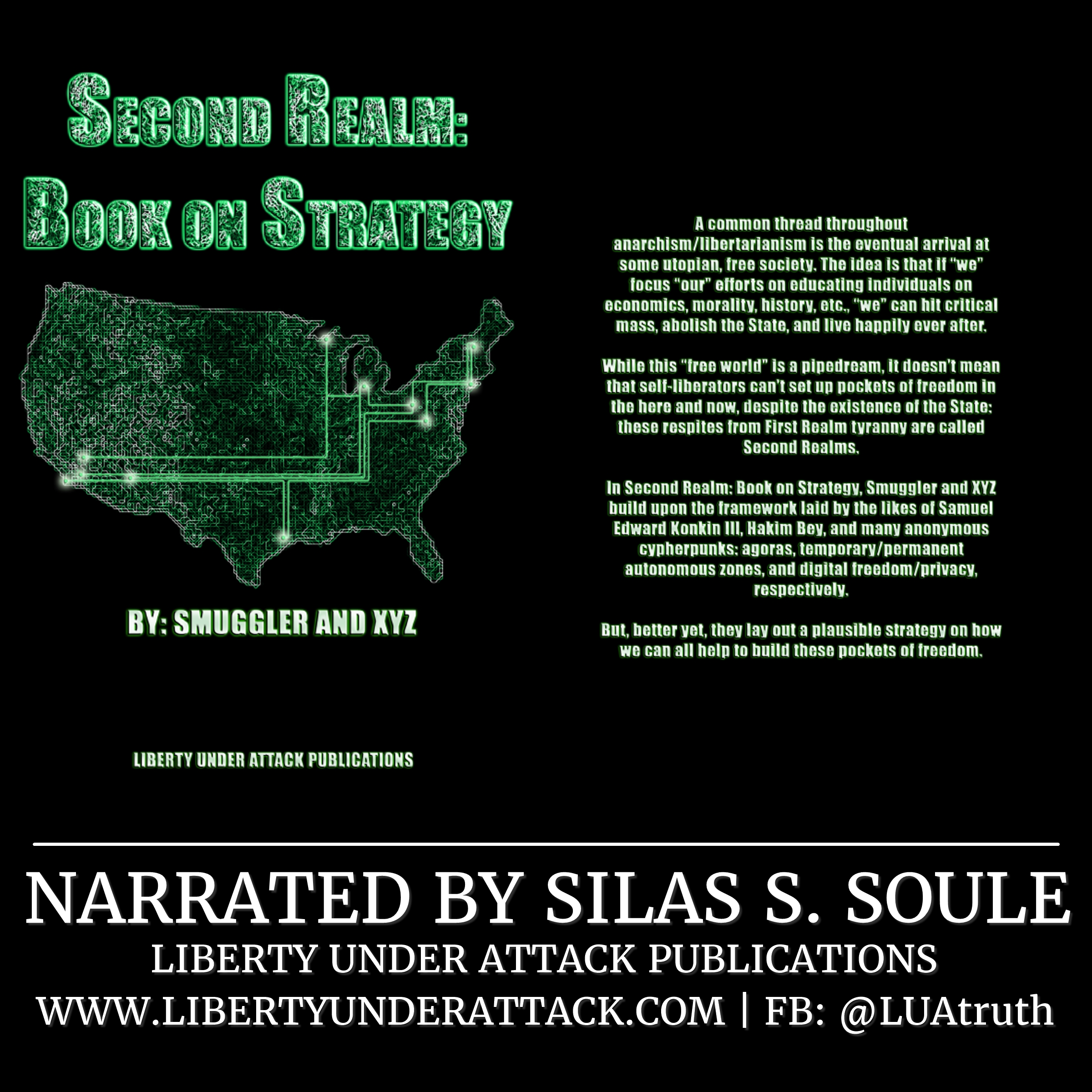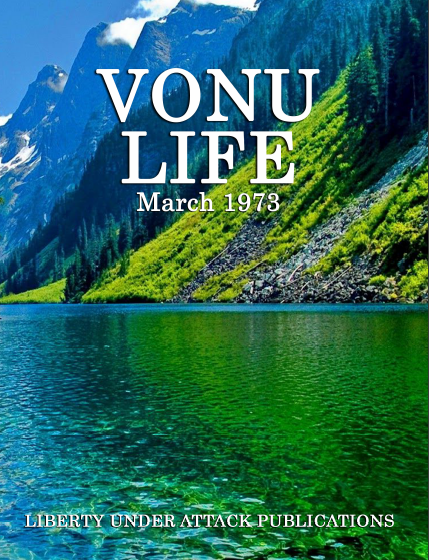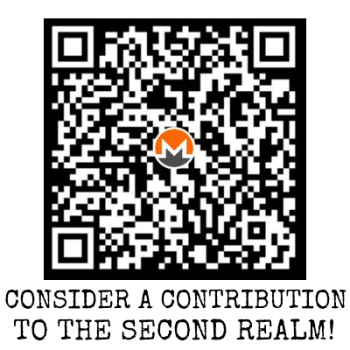Podcast: Play in new window | Download
Subscribe: Apple Podcasts | Android | Email | Google Podcasts | Stitcher | TuneIn | Spotify | RSS
On this episode of The Vonu Podcast, you’ll hear the audio versions of two articles from a new series I’m writing over at the Agorist Nexus website titled, Surveying The Second Realm.
The idea is to condense our 10+ episode, 15+ hour Building The Second Realm series down to articles of 1,500 words or less. The first article introduces the series and provides more information; the second introduces the philosophy and culture of The First Realm.
Next time, I’ll discuss the liberating philosophy and culture of The Second Realm.
SURVEYING THE SECOND REALM #1: INTRODUCTION
In this dualistic reality, light cannot exist (or really even be conceived of) without the concept of darkness; the same could be said about life and death, growth and degeneration, electricity and magnetism, and in this case, the Second Realm could not exist without the First.
Broadly speaking, the First Realm is the overarching reason strategies like agorism exist, and individuals like Samuel Edward Konkin III see the need for such action and organizing. Defined, the First Realm is the society that does not respect self-ownership or individual liberty, but rather heralds the supremacy of government and authority; in other words, it upholds the collective as superior to the individual. In agorist terminology, synonyms may include the white, pink, or red markets (taxed, regulated, and/or immoral/unethical markets, respectively); Rayo, the main proponent of vonu, called it the servile society throughout his writings in the 1960’s and 70’s.
In the incredible crypto-agorist novella, #agora, one of the main characters explains the Second Realm as such:
Technically, the Second Realm is described as encrypted communication, encrypted currencies, anonymous and pseudonymous identities and untraceable action.
To elaborate, it’s the use of various strategies and tactics with the goal of separating attribution from action (hence, the use of anonymity and pseudonymity). [On this note, I would highly recommend checking out Smuggler’s presentation at Hackers Congress from a couple years back titled “The Project of Cryptoanarchy.”] One other practical definition of Second Realms is:
Pockets of freedom, wherein individuals can conduct trade and other activities (including vices) in certain areas at particular times without reprisal from the State or “private” coercers.
These pockets of freedom can exist in physical space and time, such as Jackalope Freedom Festival, The Free Republic of P.A.Z.NIA, a seastead in international waters, or even a van nomad squat spot. They can also exist in the digital realm – think decentralized/deep web marketplaces, encrypted communication channels, the Agorist Nexus website, etc.
I’ll go into more detail on the First/Second Realm in the next couple of articles, but that brief introduction should suffice for now. The objective of this series, Surveying The Second Realm, is to take our 10 episode, 15+ hour series over at The Vonu Podcast and condense each concept/idea into an article of 1,500 words or less. Each piece should be more than enough to spark some action, but the relevant, extended episode and further resources will be linked for those wishing to continue their studies.
Back at the beginning of 2018 when Kyle Rearden and I initially put this together, the world certainly looked a bit different. The need for the building of these free realms wasn’t as much in the forefront – the conversations were more theoretical/hypothetical, and we complained often about the lack of action. There were flashes of progress here and there, such as the prevalence of the van nomadism “movement” and some scattered communities, but the pieces of this self-liberation puzzle hadn’t quite come together yet.
Well, it’s safe to say that the year 2020 has changed everything.
Whether or not they’re calling them Second Realms or something else, individuals are organizing. Websites like FreedomCells.org have seen huge surges in membership, thanks to the fear and uncertainty that has enshrouded 2020. Folks are fleeing the cities and heading to rural areas, setting up Second Realm Outposts across the countryside and wilderness. Directories are coming online, connecting these once isolated pockets of freedom. And where many were once vulnerable, they are now taking up self-sufficiency in stride, whether in the realm of food independence and/or the home manufacturing of the means of self-defense. The vision I’ve been trying to put together in my own head/explain over the years seems to be coalescing organically, by necessity – the decentralized network of self-sufficient Second Realms, catering to nomadic/traveling individuals. Or, another common trend – a freedom pioneer making some drastic lifestyle change, such as moving across the “country” in pursuit of personal freedom. It all moves things in the right direction.
That said, it’s all definitely great to see, yet there is still a lot to learn and do. Thankfully, there are texts like Second Realm: Book on Strategy by Smuggler and XYZ that lay out strategies to secure and conceptualize these realms: topics like temporary/permanent autonomous zones; proxy merchants, the facilitators of interaction between the two Realms; lessons that can be learned from organized crime; the importance of tradecraft; the blessings of technology and how it enables the creation/securing of these pockets of freedom, and action items.
The importance and relevance of culture will be an important theme throughout – namely, its role in controlling the masses and manufacturing the despotism/coercion of the First Realm, as well as its ability to connect and empower individuals via the generative force of artistic creation in the Second. Regardless of whether art imitates life or vice versa, the enemies of freedom use it to enslave – we’ll use it to liberate, a powerful tool capable of communicating possibilities in ways mere explanation likely never could.
For those newer to these philosophies and ideas, the next two articles will cover brief introductions to a wide variety of anarchic schools of action and thought, giving you a firm, abstract foundation to base your action upon. Critical principles like self-ownership, the non-aggression principle, and voluntaryism will be explored, in addition to why they’re important and necessary to incorporate with Second Realms – as a brief teaser, if we want others to respect our autonomy, we must respect that of others and forego the use of coercion and fraud. Another addition to the philosophy is that of the cypherpunk adherence and commitment to privacy – “our privacy is also a key symbol for the autonomy we live. We are taking back what a totalitarian outer world wants to steal from us.”
And possibly, in the final article of this series, I’ll examine the aforementioned novella, #agora, as there are lots of important insights to glean from that fictional application of the above strategies.
In conclusion, it’s worth emphasizing the evolutionary nature of the Second Realm; that, instead of nonsense political crusading or collective movementism, individuals are building the alternative society, culture, markets, and infrastructure, all founded upon and committed to freedom and autonomy. Due to the decentralized nature of this strategy, these pockets of freedom are here to stay, providing hope and a reliable option out of the track-and-trace servile society for those willing to make some sacrifices in the name of liberation and self-sufficiency. Smuggler and XYZ put it thusly:
Our strategy for liberty is the creation of a culture of liberty, a society that occupies its own protected space and implements independent systems of cooperation. We need to create a Second Realm.
Please join me next time, as I dive deeper into the philosophy and culture of the First Realm.
SURVEYING THE SECOND REALM #2: THE PHILOSOPHY & CULTURE OF THE FIRST REALM
At its core, the true ruler of the First Realm is fear – without it, the vast majority of the scare-mongering in this arena would be laughed off as the manipulative hysteria that it is. Another variation of this fear could also be culture/cultural codes that are often used to enforce and justify the statism of the First Realm. For example, Karen might go along with whatever if she “fears” not being invited back to book club; Jonny might have to get the vax for Ticketmaster, so he can go to his punk rock concerts again in 2021 – the “fear” of missing out on one of those is just too painful to bear.
And as I defined it in article #1 (linked above), the First Realm is the society that does not respect self-ownership or individual liberty, but rather heralds the supremacy of government and authority…it upholds the collective as superior to the individual. Individuals aren’t known to the State, the bank, or the credit card company as “Sally Smith, a mother, a human being.” They are known as a date-of-birth, a social(ist) (in)security number, a disposable resource in a system to be used, collected from, and exploited.
Next, it’s important to note the important human and societal institutions that were co-opted and are now controlled by the State and their (in many ways) fascistic, (in many ways) communistic corporations, converting them primarily into tools to enslave individuals in the First Realm. In Second Realm: Book on Strategy, Smuggler and XYZ list some of these institutions:
Money and banking systems; property titles; identity; licenses, regulations, and insurance; law enforcement and security; legal system, courts, correction, and punishment; education and media; communication, energy, and transportation networks; and charity (now welfare)
A number of these, such as property titles, charity, and legal systems, are undoubtedly important human (or in some cases, even tribal) institutions. As long as the human species is here and not extinct, there will be conflict, and therefore, ways to settle disputes (arbitration/legal systems) and ways to avoid them in the first place (clearly delineated property titling/contracting) will be needed. And in terms of charity, in dollar value (north of $400 billion in 2017), charity is still extremely popular, despite the State robbing most individuals of 30+% of their income. While we are flawed and imperfect (to put it mildly), most people exist peacefully in their daily lives and this “controlled schizophrenia” is predominantly relegated to the insane political realm. It’s unfortunate that these have been monopolized and subverted away from their original ends by the State (and their corporate cohorts), but thankfully, the Second Realm allows us to set up our own alternatives of all of these institutions, without waiting and without begging – more on that to come.
When I was listening back through this series for The Vonu Podcast re-release earlier this year, I was happy and surprised to hear me and Kyle’s 2018 discussion on the monopolies on entertainment, and how those are used by the State as propaganda outlets. I have to say, it was quite prescient when viewing the world now in 2020.
Consider this: for entertainment, the “Big Dogs” are Netflix (whose CEO/co-founder, Marc Bernays Randolph, is the great-nephew of the most prominent propagandist, Edward Bernays), Amazon Prime (who recently censored a fictional portrayal exposing modern child trafficking rings), and probably FascistTube. Throughout the scamdemic, many Hollywood personalities were used to push nonsense, and I personally witnessed FascistTube “promoting” that sort of content on a regular basis – one in particular that I recall often is Trevor Noah, and for one week in particular, his interview with F(r)au(d)ci.
For professional sports, consider that there’s only one NFL, one NBA, one NHL, etc. Sure, there are minor league teams (like AAA, AA, etc.), but no one can honestly say those are “competition.” These are government-sanctioned monopolies that are often given exorbitant amounts of stolen taxpayer funds for luxurious stadiums. And in return, these bread-and-circus clowns are more than happy to parrot whatever propaganda or even stop the circus altogether if their political/corporate ringleaders demand it.
To bring up culture once again, it’s certainly not one of empowerment, with the goal of elevating the consciousness of man. Certainly not. Rather, the culture of The First Realm is quite degrading – it fosters and promotes reliance over self-sufficiency; division over unification; artificiality over nature; religious belief over knowing (science/observation), etc. It’s largely devoid of values or anything of actual relevancy – sure, there are “truth drops” at times, but you have to wade through a lot of bullshit to get to them.
I’d be remiss if I discussed The First Realm in-depth without mentioning government indoctrination camps (“schools”). Walter Russell, a luminary similar to Nikola Tesla in the early-to-mid 20th century, once recommended (I’m paraphrasing) nothing over a 4th grade education; reason being, it required the individual to unlearn SO MUCH that it wasn’t really worth it. Agree or disagree, he’s got a point. It’s something I’ve complained about, and something I’ve heard many others in the freethinking realm complain of – it takes years and years to get back to a “baseline of truth.”
And after this year, with the deception being so visibly widespread and intense, I’m to the point of believing nothing, starting at square one, and finding my way back to reality. If you think that sounds hyperbolic, I’m afraid you aren’t thinking big enough, my friend.
It’s like I tweeted earlier this month: “The servile society [the First Realm] is first and foremost a deceptive illusion, intended to confuse individuals into giving up their lives, freedom, and futures. Never forget it.”
As one other way of explanation, here’s Smuggler and XYZ again:
“The interwoven aspects of culture, institutions, profits from redistribution[,] and the longing for stability form the foundation of the power of states and assure lasting consent (both passive and active) for this system of domination. We call the totality of this system: The First Realm.”
And while all of this may sound depressing and pessimistic, it’s not intended to be. It’s merely an examination of The First Realm as it stands, so that we can both learn how to avoid its pitfalls and traps, as well as how to transmute these now-negative influences on human society into positive ones. Two important conclusions must be made in this regard:
- Culture is critically important.
- Independence and self-sufficiency are critical principles.
And a third, final point, excerpted from Second Realm: Book on Strategy:
It is required to form independent systems of cooperation that are formed on the ethics of liberty and that are not dependent upon or connected to institutions of control…We need to create a Second Realm.
Please join me next time; we’ll be discussing the liberating, empowering philosophy and culture of The Second Realm. In the meantime, let’s get building.
Show Notes:
Get the paperback book from Liberty Under Attack Publications!



3 Replies to “TVP #95: SURVEYING THE SECOND REALM #1 & #2”